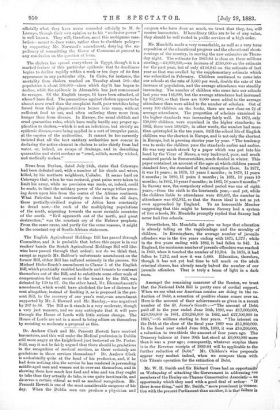Mr. Mundella made a very remarkable, as well as a
very terse exposition of the educational progress and the educational short- comings of the country, in moving the new estimates on Thurs- day night. The estimate for 1883-84 is close on three millions- sterling,—£2,938,930,—an increase of £189,000 on the estimate- for the past year, but of only £146,945 on the estimate of last year as that was swelled by the supplementary estimate which, was submitted in February. Children continued to come into our schools at the rate of 3,000 per week, double the rate of the increase of population, and the average attendance was steadily increasing. The number of children who came into our schools- last year was 144,000, but the average attendance had increased by 152,000, so that there are 8,000 more added to the average attendance than were added to the number of scholars. Out of every 100 children on the books, there are now close on 72 of average attendance. The proportion of scholars examined in the higher standards was increasing fairly well. In 1872, only 118,000 children were examined in the higher standards; in 1882, there were 599,029; in other words, the number had more- than quintupled in the ten years. Still the school life of English children was the shortest in Europe, and is not only the shortest. in Europe, but is growing shorter year by year. "The tendency was to make the children pass the standards earlier and earlier.. He was very mach struck by a paper which was put into his. hand by the Vicar of Mea.re, a very backward, poor, and much scattered parish in Somersctshire, much flooded in winter. This paper contained an account of the ages at which children passed standard four, the standard of total exemption there. In 1877, it was 14 years ; in 1878, 13 years 5 months ; in 1879, 11 years 8 months ; in 1880, 11 years 2 months ; in 1881, 10 years 10, months ; in 1882,10 years 9 months ; in 1883,10 years 8 months." In Saxony now, the compulsory school period was one of eight. years,—from the sixth to the fourteenth year,—and yet, while the children liable to attendance were 493,467, the number in attendance was 492,912, so that the Saxon ideal is not as yet- even approached by England. To an honourable Member- suggesting that this might be because Saxony had a system of free schools, Mr. Mundella promptly replied that Saxony had never had free schools.


































 Previous page
Previous page